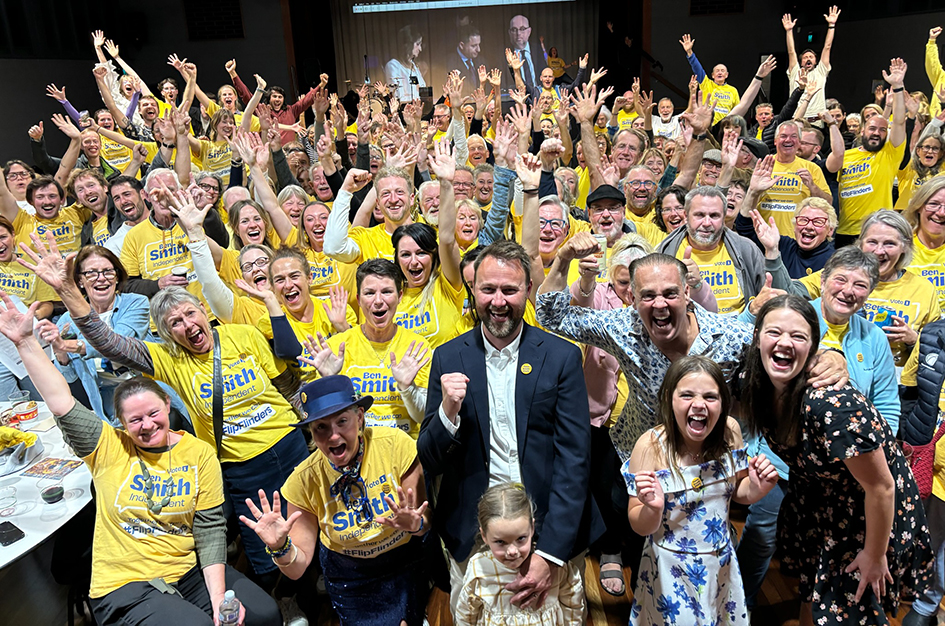The federal seat of Flinders is a safe Liberal seat no more. The seat has been held continuously over the last half-century by the Liberal Party, except for a single period between 1983 and 1984. It is now going to be held by the Liberals by the slimmest of margins or potentially even lost.
What we know is the result is still unclear with the Australian Electoral Commission currently “estimating” that 102 votes separate Liberal Zoe McKenzie and independent Ben Smith. This is with 89,482 votes currently counted and preference distribution incomplete. For reference, there were a total of 104,589 votes in the electorate in the 2022 federal election.
During election night, the AEC provided a “two candidate preferred” graphic showing the estimated outcome between the Liberal incumbent Zoe McKenzie, and Labor’s Sarah Race.
Around 10pm, this graphic disappeared with the AEC possibly re-evaluating the outcome in consideration of potential preference allocations, placing Smith into the two-candidate-preferred mix.
Currently, McKenzie’s primary vote sits at around 39.5%. This figure is about 4% down on her results in 2022 when she polled 43.49% of the primary vote.
Labor’s Sarah Race has lifted her party’s primary vote slightly and is currently at 22.53%, compared to 21.73% of the primary vote in 2022.
The great disruption in 2025 was the campaign of independent Ben Smith. The Climate 200-backed candidate attracted 23.12% of the primary vote. Comparison can be drawn from 2022 where two “community independents” stood; Sarah Russell who managed 5.25% of primary votes and ex-councillor for the Mornington Peninsula Shire Despi O’Connor who managed 7.24% of the primary vote. Together the two “community independent” candidates attracted 12.49% of the primary vote in 2022. This equates to more than a 10% jump in votes to the “community independent”.
The result in Flinders will now down to preferences and it may be days before we have an eventual winner.
McKenzie is at a distinct disadvantage when it comes to preferences. McKenzie can count on One Nation preferences. Mike Brown, One Nation’s candidate in Flinders, ran a vocal campaign in support of McKenzie, and polled around 5.45% of the primary vote; a two percent jump on One Nation’s primary vote in 2022. Beyond the preferencing from One Nation, it becomes much less clear for McKenzie.
On the other side of the ledger, Labor and independent Ben Smith gained around 22.5% and 23% respectively of the primary vote. This creates a block of a little under 46% assuming preferences from those that voted Labor would head towards Smith above the Liberals and vice-versa.
Looking down the ticket, the Greens preferenced Smith over Labor. Having said that, the Greens primary vote has fallen substantially in Flinders, currently sitting at a little over 6% of the primary vote, compared to 9.4% of the primary vote in 2022. Much of this can be attributed to the strong independent candidate but will no doubt have been influenced by the fact the candidate, Adam Frogley, lived well outside the electorate in Healesville.
The situation is much less clear with the Trumpet of Patriots, with the Clive Palmer-backed party controversially placing Liberal Zoe McKenzie last on its how-to-vote card. The move prompted the candidate, Jason Smart, to withdraw his candidacy and implore voters to “put him last”, instead campaigning for One Nation’s Mike Brown (Palmer candidate pulls the plug – ‘Put me last’, The News 20/4/25).
Not all ToP supporters headed the call with the primary vote running at around 2.5%. The preference fate of over 2000 ToP votes could be consequential in a result that will come down to a handful of votes.
If ToP voters followed the how-to-vote card suggested by the party head office, it could see preferences heading to Smith or Labor above McKenzie. But from a practical standpoint, Smart not campaigning for the party he was the nominated candidate for would have resulted in little to no how-to-vote cards being distributed on election day, leaving ToP voters without the controversial HQ guidance to preference conservative McKenzie last.
That leaves Joseph Toscano who attracted under one percent of the primary vote. Toscano instructed voters to put him first, but decide preferences for themselves, so it is unclear how that will play out in terms of preferences.


